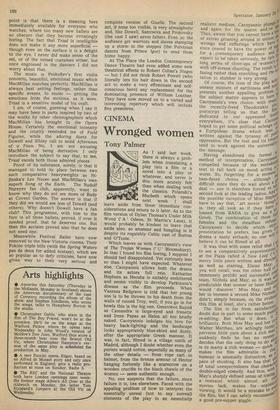CINEMA
Wronged women
Tony Palmer
As I said last week, there is always a prob lem when translating a play into a film or a novel into a play or whatever, and never is this more acutely felt- than when dealing with the classics. Polanski's Macbeth which opens next week I shall leave aside from these immediate con siderations and return to it later. As to the film version of Dylan Thomas's Under Mille Wood (' A ' Odeon, St Martin's Lane), it would probably be kindest to leave that aside also, so amateur and bungling is it despite its roguishly Celtic cast of Burton and O'Toole.
Which leaves us with Cacoyannis's view of The Trojan Women (' U ' Bloomsbury). In that I found his film boring, I suppose I should feel disappointed. Yet curiously less so than I might have expected. Whatever else, Cacoyannis allows both the drama and its actors full rein. Katharine Hepburn as Hecuba is suitably embittered and seems visibly to develop Parkinson's disease as the film proceeds. When Vanessa Redgrave is told that her young son is to be thrown to his death from the walls of ruined Troy, well, if you go in for howls this is the big one. Genevieve Bujold as Cassandra is large-eyed and frenetic and Irene Papas as Helen all too briefly naked. Cacoyannis indulges his love for heavy back-lighting and the landscape looks appropriately blue-skied and dusty, after the appropriate Greek manner. It was, in fact, filmed in a village north of Madrid, although I doubt whether even the purists would notice, especially as many of the other details — from rope cart to helmet, from the bronze armour of Hector hanging forlornly like a scarecrow on a wooden crucifix to the black shawls of the women — seem authentic enough.
No, one suspects that the failure, since failure it is, lies elsewhere. Faced with the appaling problem of how to interpret the essentially unreal (not to say surreal) elements of the play in an essentially realistic medium, Cacoyannis pluniPs.4 and again for the quaint and/or br; Thus, aware that you cannot have a t of extras groaning around in unison 8";0 wrongs and sufferings which have since ceased to have the power of 19; for a contemporary audience and cci. expect to be taken seriously, he opts 'd long series of close-ups of women's "4 with off-screen chanting. The result fusing rather than ennobling and the' tation to slumber is very strong. .0, Of course, the tone of the play viluo uneasy mixture of earthiness and Miti presents another appalling problem. 0 the subject matter appears to have Cacoyannis's own choice: with irlls,„'s the recently-freed Theodorakis postscript telling us that thefiltitilo dedicated to our oppressed br.,esso everywhere, it's clear that Caautit, hoped to get some political mileage °II a Euripidean drama which was written against the tyranny of Pv:„0 oppression. But the text and its treat,' tend to work against the universal° the message. 85 Having abandoned the formal is method of interpretation, Cacoyarul'i compelled because of the melodriallti text to fall back on mood acting 8, worst. So, forgetting for a mornelli0 ham-fisted chorus — although 14 difficult since they do wail about a ago deal — one is therefore forced to t, second look at the leading ladies. AO the possible exception of Miss HePbuti t) have to say that, 'art movie' thourv is, they all look as if they haveor loaned from RADA to give us a ,egif Greek. The combination of these females and the steadfast refusaie • Cacoyannis to decide which atYrd presentation he prefers, has given drama a nasty setback; no one Wil believe it can be filmed at all. I 41 It was thus with some relief that , to see a comparatively unpretentiolltl$ at the Plaza called A New Leaf ( merry little piece written and direct 0 as well as starring, Elaine MaY'„f0 you will recall, was the other half immensely prolific and successful e"igi team, Nichols and May; so it Wa5„9 predictable that sooner or later HooY: would 'discover' Miss May, and ,e4. her to become a second Mike NichoP,4 didn't; simply because, on the evideffr this film at least, she's rather bettet:dri The film is far from satisfactlej1 doubt due in part to some much Pu,b, $ re-editing. But what it does, brilliantly. Both Miss May and her C" Walter Matthau, are achingly 11M 113101I perverse little yarn about a rich rilt suddenly finds he has no morloli decides that the only thing to do PO is to marry a rich woman — quicK. makes the film admirable is triao humour is unusually distinctive, asmill pace of shooting. It also has that :tejl of total unexpectedness that chara'oi double-edged comedy. And this, IStb; May's sharply defined sense of tinlinon'fil a restraint which almost all co movies lack, makes for sophiSof viewing. It would be a mistake to ()(1 the film, but I can safely recominen a good pre-supper giggle.










































 Previous page
Previous page